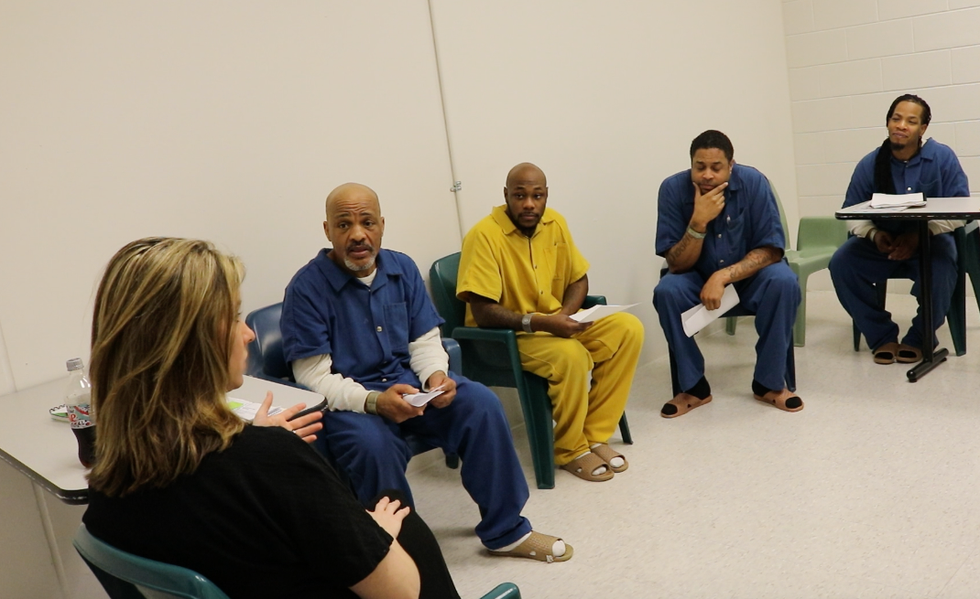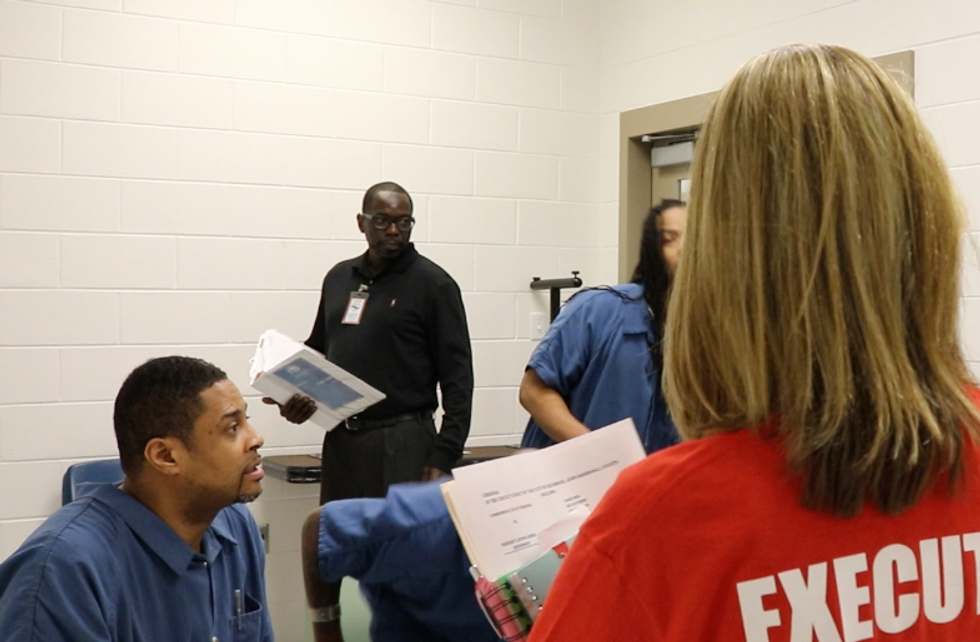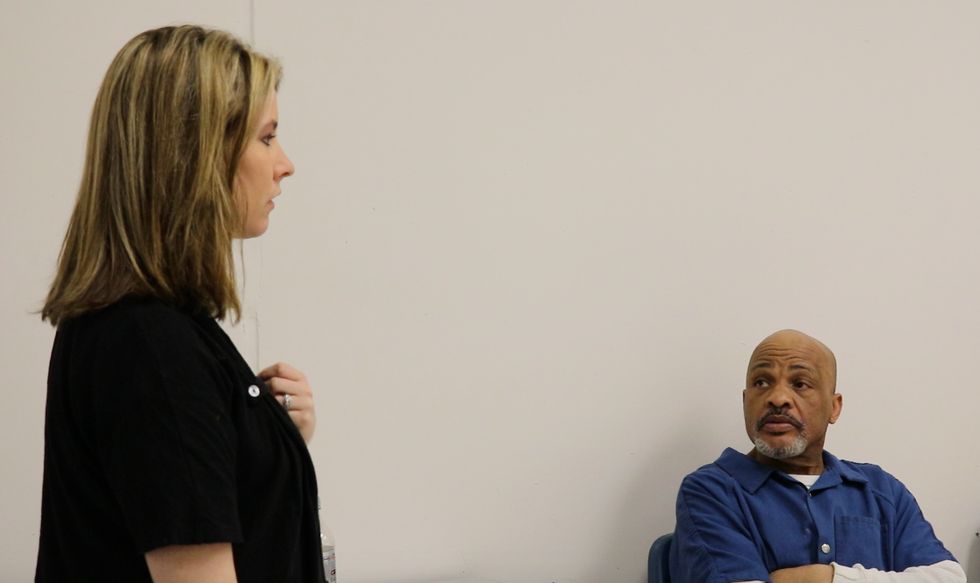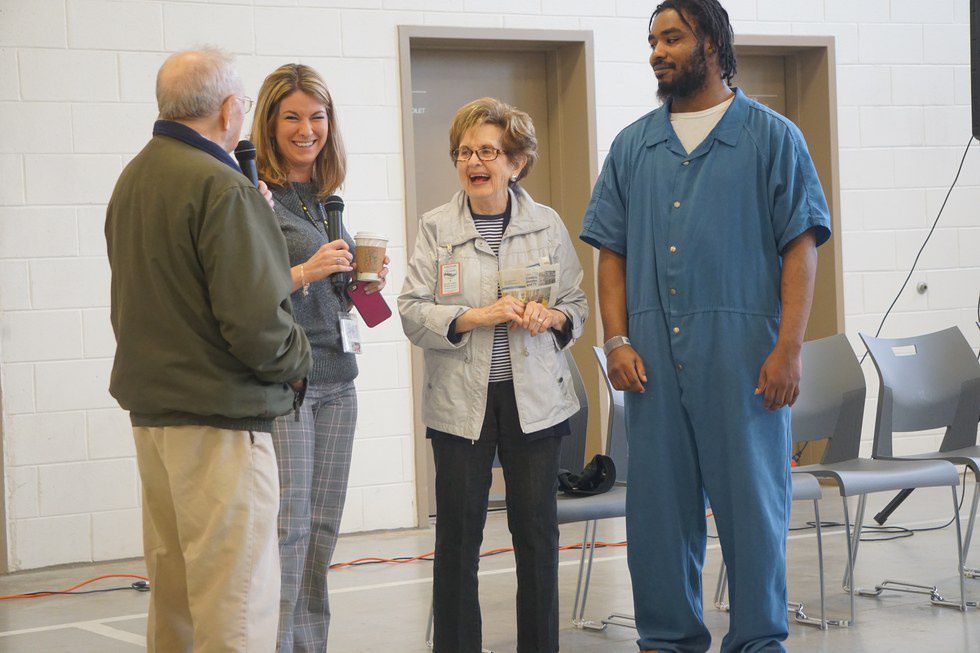RICHMOND, Va. (VCU Odyssey) – Dr. Sarah Scarbrough, internal program director at the new Richmond City Justice Center located downtown near Mosby Court, is innovating her “Recovering from Everyday Addictive Lifestyles” (REAL) program to provide RCJC residents with the tools and skills to succeed after their release.
There’s soft spring in her step as she chasses through the echoing hallways of RCJC to collect homework assignments from her class of residents.
Scarbrough’s intense nine-to-five style program includes job training, talent shows, collegiate classes, mock interviews, resume writing workshops, and a 12-step system and broken up into four “phases” to assure when they’re released from jail, they never return.
During class, residents discuss what they have written for this week’s assignment; many have different ones.
“So, phase one. Do you have that for me?” Scarbrough asked one of her residents.
“Yes, I do,” he replied.
“We asked you to do phase one to get a jumpstart on your motivation,” she said. She then asked him to talk about what he wrote this week. She listens to the resident attentively.
“Even when I’m trying to push that positive side, I’m still left with the negative,” said the resident, explaining how positivity motivates him. “I’m trying to push more positivity.”
Her passion to assist residents back into the community has given her nicknames such as “mom” and tasks such as helping one open up his first bank account at the age of 40 or organizing the DMV to stop by and make IDs.
Sometimes more "tough love" is required – most of the time, the bright smile doesn’t escape her face.
Scarbrough works closely with RCJC residents involved in REAL's Fatherhood program. © Sidney Randolph for The Odyssey at VCU
When Scarbrough’s graduate assistantship supervisor suggested she obtain her Ph.D. after a Master’s in criminal justice, Scarbrough originally scoffed at the thought of studying another five years.
“I listened to her advice,” Scarbrough said, stifling a laugh, “and through that I was really able to dive in deeper and figure out what I wanted to do.”
While working on her Ph.D. in public policy from the Virginia Commonwealth University Wilder School of Government and Public Affairs, Scarbrough focused her research on recidivism rates among drug and substance abuse offenders.
The National Institute of Justice defines recidivism as “a person's relapse into criminal behavior, often after the person receives sanctions or undergoes intervention for a previous crime.”
The program she studied was offered through the Richmond City Jail and sponsored by the McShin Foundation, taking “the worst of the worst” and guiding them away from illicit substances in order to keep offenders from returning to jail after their sentence ends. According to John Shinholser, president and board member emeritus of McShin, the foundation sponsors five recovery and reentry programs in the metro Richmond area.
Scarbrough admits she was “terrified” when she first entered the room.
“I was in [the housing unit] with 120 convicted felons,” she said. “But the moment [I] walked in, I realized this was not scary anymore.”
Five years of research, hundreds of hours spent at the jail, and 223 pages of dissertation later, Sheriff C.T. Woody offered Scarbrough a full-time job as internal program director. What went from a requirement to fulfill a degree turned into a life-long passion.
When Scarbrough stepped into the old Richmond City Jail, she knew the programs needed an overhaul. The previous jail closed in early 2014 to make room for the current 1,032 bed Richmond City Justice Center.
State and local governments across the country pay thousands of dollars to house one inmate in jails and prisons. The United States is currently the world leader in incarceration, with one in 36 adults behind bars in 2014, according to the Bureau of Justice Statistics. This equates to roughly 2.3 million imprisoned. In Virginia, the cost of arrest costs more than $5,200, according to a 2013 study by the Justice Policy Institute.
Scarbrough said the old jail was “built to warehouse people." Despite efforts and programming to assist residents, Scarbrough was concerned the “1960s mentality” of “locking up and throwing away the key” wouldn’t be the most effective.
“There was never a holistic plan to address these behaviors,” she said.
Scarbrough seeks to provide REAL program participants a "holistic" approach to addressing their behaviors. © Sidney Randolph for The Odyssey at VCU.
According Shinholser, there is a total recidivism reduction of 18 percent and cost savings of nearly $8 million after residents went through the extensive program. A reduction as significant is credited to Scarbrough’s REAL program, which she dubs “a full time job” for residents. REAL is not funded, she said. Each facet of the program is donated by patrons within the community.
“[Residents] start at 8 a.m. with a cell inspection,” she said, pulling out the jam-packed schedule, “then they have their first meeting at 8:30...they go until 7 p.m.”
Residents who do not show up to the first meeting on time are not allowed to participate in any scheduled activities that day. Scarbrough said the purpose of punishment is to “ingrain structure” into residents’ lives and ultimately carry those skills once released.
Seventy-eight percent of the population of RCJC is there due to drug addiction, she said. REAL’s system is designed to strip the behaviors still existing even when the physical addictive substance is taken away during a sentence.
Scarbrough said Virginia claims to have the second lowest recidivism rate in the country. However, she said her personal time spent at the jail competes that claim as only prisons are calculated in that figure, not jails.
In 2014, Gov. Terry McAuliffe announced a 22.8 percent reduction in recidivism in Virginia. The figure, according to the Virginia Department of Corrections, is based on an offender’s repeat incarceration within three years of release.
“That is only reflective if they have gotten out of prison and they go back to prison,” she said. “The numbers are very, very skewed.”
REAL has been in effect just under two years. In 2015, 849 men and 79 women went through Scarbrough’s extensive program, which roughly calculates to about 10 percent of the City of Richmond’s population. Scarbrough said she does not have sufficient data yet, but is working on an evaluation for current residents.
Residents, however, speak highly of their experiences thus far.
Cary Deslandes, a current resident at RCJC working on his addictions, said he came into the REAL program “to keep his family together.”
“I wanted to give my wife some hope,” said Deslandes, “that I came to the Richmond City Jail doing something productive, rather than just sitting in a chair doing nothing.”
Deslandes said each “phase” of the program – which is based on the 12 Steps – tackles different problems from substance abuse, to motivation, to relationships, and more. He said he “continued to grow” throughout the phase work.
Another resident, Lynn Evans, 59, said he had been using drugs all his life before entering REAL.
“I’ve never seen a program like this before,” said Evans. “It motivates you to want to do better in life.”
Both Deslandes and Evans said they have faced numerous challenges throughout their duration, but are grateful for the support system and learning opportunities.
“The REAL program means life,” said Deslandes. “Not just existing life -- but living life.”
“[REAL] means a way of life,” Evans said. “It’s showing me that even though I’m incarcerated, I still have a chance.”
REAL program participants, Cary Deslandes and Lynn Evans talk about their experiences with addiction, incarceration, and their tenure in the program.
Carlos Jackson, a graduate of REAL, was sentenced for selling and possession of drugs.
“[The “REAL” program] is designed to enhance recovery,” Jackson said. “But, you have to first know what you’re recovering from.”
Scarbrough said Jackson “truly embraced every opportunity” while incarcerated. Under her supervision, Jackson was awarded RCJC’s first housing scholarship; his first two months’ rent was covered, and was donated furniture, toiletries, and food to kickstart his life once he officially released.
“If this intervention didn’t occur, he would have been homeless upon release,” Scarbrough said.
Jackson said he was “never big on drug abuse,” but did sell them. He was in the program about 10 months. Later, he went on to become a leader in group sessions to assist newer program members.
Jackson said he was denied food stamps once his life began to stabilize.
“They have a new system,” he said. “Now, you have to at least maintain a job no less than 20 hours a week. When I got out, I didn’t have that.”
In order to become eligible for the food stamps, Jackson had to attend workshops weekly for a minimum of 20 hours per week. He said that now he has two jobs, his income is steady enough to support himself without food stamps.
“Without the donations, it would have been really hard for me,” he said.
Scarbrough said with a program this extensive; there are always challenges, especially with younger residents thinking they’re "invincible." Residents like Deslandes, Evans, and Jackson prove how more offenders are seeking change.
Her tone shifted dramatically as she mentioned how disheartening it is to tell a resident about to release that they are unable to get housing.
The average cost of rent in Richmond was $871 in 2013, according to national statistic site City-Data. Scarbrough gave an example of the unsafe housing many residents are forced to live in post-release. Homeless shelters are often "too competitive" of a solution.
“I have a guy who was able to move out of the projects...he’s since moved back to the projects,” she said. “Not because of a desire to be in the projects in a dangerous area where he can’t play outside -- he can’t afford it.”
Scarbrough announces which residents were selected for this year's father/son event. Male residents will be playing basketball with their sons at an exclusive event on June 22, 2016. © Sidney Randolph for The Odyssey at VCU.
Scarbrough has worked alongside housing officials to find safe and reliable housing for her released residents, but is often unsuccessful finding anything less than $500 per month in what she considers a “semi-decent neighborhood.”
The same resident for whom she found housing was cursed to watch a 12-year-old girl fatally shot outside his back window.
She suggests the city look into permanent housing and “intermingle” them with safer neighborhoods.
She also mentions how the Richmond Redevelopment and Housing Authority (RRHA) refuses to rent to felons. RRHA has been contacted for comment, however they have yet to respond.
The city, Scarbrough said, has hundreds of initiatives in place, but she believes they are not doing “the right thing.”
“You’re talking about someone with horrible credit, someone who is a felon...who is going to want to rent to them?” she said. “So, they’re all illegally living with girlfriend, or baby mama, or whomever because no one will rent to them. The city needs to truly think about this.”
But Scarbrough manages to remain positive. She said the larger issues with housing and locating jobs can be draining, but smaller issues such as gathering donations or buying toilet paper balance it all out.
On Wednesday, May 18, Scarbrough (second from left) brought in two local Holocaust survivors to speak to those in the REAL program. © Keyris Manzaneres for The Odyssey at VCU.
“There’s no typical day,” she said in reference to her daily schedule. “Expect the unexpected.”
Scarbrough remains humbled by her job, and continues to learn every day from the residents and their response to the program. Some days, there are residents unwilling to change. But other times, her phone explodes with calls, text messages, and emails thanking her for the work she does.
Despite doubters, Scarbrough said 95 percent of people incarcerated will be released (Bureau of Justice Statistics), therefore it is vital to assist reentry while still incarcerated.
“The question is,” she said, “do you want them coming back as a better criminal, or a better citizen? We interact with the criminal justice community every day. You or I could be the next victim.”









 Energetic dance performance under the spotlight.
Energetic dance performance under the spotlight. Taylor Swift in a purple coat, captivating the crowd on stage.
Taylor Swift in a purple coat, captivating the crowd on stage. Taylor Swift shines on stage in a sparkling outfit and boots.
Taylor Swift shines on stage in a sparkling outfit and boots. Taylor Swift and Phoebe Bridgers sharing a joyful duet on stage.
Taylor Swift and Phoebe Bridgers sharing a joyful duet on stage.













